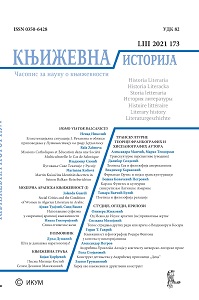Андрићева Проклета Авлија у контексту затворско-логорске прозе
Andrić’s The Damned Yard in the Context of Prison and Camp Prose
Author(s): Aleksandar PetrovSubject(s): Serbian Literature
Published by: Институт за књижевност и уметност
Keywords: prison and camp literature;narrator types;document and fiction in prose literature;chronotope;literature and totalitarianism;
Summary/Abstract: The goal of this scholarly article is to provide a critical and literary assessment of The Damned Yard by Ivo Andrić, by approaching it in the context of “prison and camp prose” as well as the theoretical corpus dedicated to it and written mainly in the Russian language, considering that mainly due to well-known social circumstances beginning with the times of Dostoevsky and Chekhov and continuing in those of Solzhenitsyn, Shalamov and others, the latter held a dominant position in world studies on this theme almost until the late 1980s. Andrić’s The Damned Yard is a representative of the existential type of “prison and camp prose”, initiated by Dostoevsky’s novel The House of the Dead,. Andrić’s novel is a prime literary work pertaining to this type of “prison and camp prose” associated also with Shalamov, while Solzhenitsyn is probably the best known author of the realistic-historical type. An additional goal was to study the relationship between The Damned Yard and Serbian works pertaining to “prison and camp prose” written on the second half of the 20th century and the beginning of the new millennium, by authors such as Ivan Ivanji, Borislav Pekić, Dragoslav Mihailović, Danilo Kiš, David Albahari, to mention only a few. The article makes references to “Praznično veče” (“Holiday Eve”), a story by Isak Samokovlija which precedes The Damned Yard, and the novel Jasenovac (1980) by Ljubo Jandrić , both discussed in the novel Like Gold In Fire (first edition 1998) written by the author of the present article.
Journal: Књижевна историја
- Issue Year: 53/2021
- Issue No: 173
- Page Range: 325-347
- Page Count: 28
- Language: Serbian

